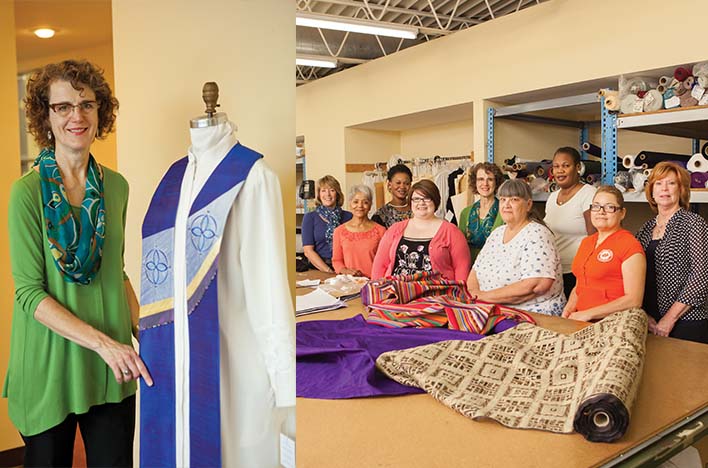The number of women serving in the clergy has continued to rise, and with it, so has the need to be appropriately attired.
One Kansas City company has been around for more than two decades making sure women clergy have been dressed for success with garments made just for them.
WomenSpirit, 1335 Swift St. in North Kansas City, designs and manufactures clerical robes, vestments and other garments designed to fit “body and spirit.”
Today, owners Patty Fitzpatrick and Ann Suarez work with an all-female team producing more than 1,200 handmade robes plus clerical blouses, shirts, stoles and other accessories for women.
Sales come from across the country and around the world; 80 percent of WomenSpirit’s business comes through its website. In 2009, a separate line for male clergy was launched under the label Abiding Spirit.
The women-owned business was the brainchild of Fitzpatrick, who learned to sew from her grandmother. Fitzpatrick earned a degree in apparel marketing and merchandising from the University of Missouri.
“I pretty much got my degree because I liked working with fabric and I liked making clothes,” said Fitzpatrick.
In The Beginning
In 1994, a friend asked Fitzpatrick to make a costume for a one-woman show about a female saint. Women clergy who saw the outfit asked if Fitzpatrick could create robes for them.
“While more women were entering the clergy, robes weren’t made to fit women or have an image that women wanted in the ministry,” Fitzpatrick said.
With her children in school, Fitzpatrick was ready to return to work and started making clerical robes out of her home. With a background in bookkeeping learned by helping in her parents’ businesses, Fitzpatrick was comfortable handling the business side.
‘I Think We Need Help’
However, when it came to manufacturing, Fitzpatrick felt a gap in her skill set. She took an entrepreneurial class at Avila College, and the instructor suggested she connect with someone in the clothing manufacturing business. Fitzpatrick reached out to Gretchen Van Horn and interned with her company, Gretchen Inc.
“She had her own line of women’s clothing, and she became my mentor. … Honestly, that is the reason we became a success,” Fitzpatrick said.
“Garment manufacturing is not a high-profit business. She had this wealth of manufacturing experience. … I learned how to make the patterns for manufacturing, which is totally different than home sewing. She gave me the idea to make the robes in sizes and cut them all at once where you can save time and money.”
When Van Horn closed her business, Fitzpatrick bought all of her equipment and hired her main seamstress. In those early days, Fitzpatrick did all the cutting, and the seamstress did all the sewing.
“After two months, she said, ‘I think we need help,’ and I started hiring,” Fitzpatrick said.
Steady Growth
Today, Fitzpatrick still does all the design work, but her nine employees handle the rest, along with a cadre of home seamstresses whom WomenSpirit uses from time to time.
“We have had a couple of men who did work for us —one did sewing and one worked in shipping and answering the phones, but it was a little strange to have this low voice answering ‘WomenSpirit,’” she said with a chuckle. “It just works out that we have all women.”
WomenSpirit has grown steadily ever since. In 2000, Suarez came on as a partner, and the company moved from the Crossroads to its present location north of the river.
“I would not be here today if it wasn’t for Ann helping to manage the business,” Fitzpatrick said.
Looking Toward The Future
Not resting on its laurels, WomenSpirit continues to develop new product lines to stay ahead of its competition.
“We want to serve our customers and expand their selection and alternatives to do their job,” Fitzpatrick said. That, in part, drove the decision to add the men’s line.
“We also have a lot of pastor couples, so it was to have a product that could coordinate the male and female look,” she said.
In March, WomenSpirit added a new line of dress, and plans are in the works to expand the men’s vestment line.
“When we go to conferences, people who are not clergy see us there and ask about our lines, so it’s possible we might market and expand to them,” she said.

